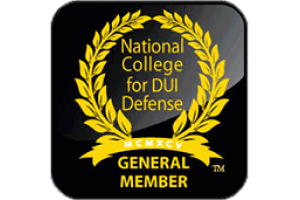DWI Breathalyzer Refusal
One of the most commonly charged DWI-related offenses in Virginia is “refusal of tests” (or “refusal” for short) under Virginia Code section 18.2-268.3. This is perhaps one of the least understood charges in Virginia, and the first time most people learn about the refusal charge is when they are arrested for DWI . This article is intended to explain what Code section 18.2-268.3 is all about, how to avoid this charge, and what to do if you have already been charged.
Refusal of Tests: The History Behind the Law
Over the past fifty years, DWI laws have become more and more strict. Organizations such as Mothers Against Drunk Driving (MADD) and other groups have effectively lobbied state governments to increase punishments for DWI and DUI. One difficulty for law enforcement was what to do with people who simply refused to take any field sobriety tests or blow into a breathalyzer after they were arrested. Even if a person was swerving all over the highway or had difficulty standing up when they got out of their car, it is difficult to prove beyond a reasonable doubt that these issues were caused by alcohol. After all, perhaps they swerved to avoid potholes in the road, or maybe they just have bad balance. Many drivers were found “not guilty” because even though a judge or jury suspected that a person was driving while intoxicated, they just could not prove it.
Because of these problems, state governments created the refusal laws to make it an offense to refuse to take a breathalyzer or other blood alcohol test under certain circumstances. Of course, most people don’t know how this law works, but that problem is partially solved by a requirement that police officers explain the refusal law and how it works after they arrest someone for DWI.
Refusal of Tests: How It Works
The refusal of tests law under Virginia Code section 18.2-268.3 works together with another law known as the “implied consent” law. The implied consent law (Code section 18.2-268.2) says that anyone operating a motor vehicle in the Commonwealth of Virginia automatically consents to a blood or breath test if they are arrested for a DWI or DUI type of offense. This means that just by driving down a road in Virginia, you have automatically agreed to take a breathalyzer if arrested for DWI, just like you agree to obey the speed limits and so on. If you are arrested for DWI and you don’t take the breathalyzer, the refusal law kicks in to punish you.
The same law that makes refusal illegal also requires that police officers explain this law to the people they arrest. There is a state form that explains the refusal law that will generally be read to a person arrested for DWI. In theory this means that every person should understand the consequences of a refusal when they are arrested. The problem is that often a person may be tired or (let’s face it) somewhat intoxicated, and the form is written in complicated legalese that does not really explain anything. Police officers are generally not thrilled when a person demands an explanation and do not bend over backwards to explain how the law works. The result is that a person is often quickly read a form they don’t fully understand and then charged with refusal when they ask for further clarification.
Refusal of Tests: PBT vs. BAC
One specific legal issue is important enough to discuss on its own, and that is what the law says about when a person must take a breathalyzer. The particulars are very complicated and an individual case should be analyzed by a lawyer with experience in Virginia DWI law, but the basic rule is that a person is required to take the test only after they are arrested. Here is why that is important: officers will generally ask a driver who they suspect of DWI to take so-called “field sobriety tests” and a small breathalyzer test on the side of the road. This small breathalyzer is usually referred to as a “preliminary breath test” or PBT, and it is completely voluntary! Officers might threaten or coerce a driver to take this test, but the law says there is no requirement to do ANY test on the side of the road. In fact, law enforcement often just wants an impaired driver to take these tests to justify the eventual arrest. Once arrested, the officer will usually take a driver to the police station or jail to perform an official breathalyzer test of blood alcohol content (BAC) on a larger, more reliable machine. This BAC test after the arrest is the mandatory one and is required to be taken by law.
Refusal of Tests: Punishment
A first violation of 18.2-268.3 is a civil offense, like a speeding ticket. However the punishment is quite severe – the court is required to take away a guilty person’s license for one year. However, recently the law changed to allow a judge to allow for a restricted license to be issued after 30 days in cases where a person is convicted of refusal of tests. Previously, no restricted license could be issued at all, so this is a positive development in the law, though it is at the court’s discretion to grant a motion for a restricted license.. If found guilty of driving while intoxicated and refusal, a person can lose their license for two years total, because they are punished separately, so the consequences are quite harsh.
If a person has been found guilty of a refusal or DWI in the past 10 years, a violation of 18.2-268.3 (refusal) becomes a criminal offense. So it is only a civil offense if a person has not been found guilty of a similar charge in the past. This also means that refusal can be charged as a second offense even if there was no first offense, in a situation where a person has been charged in the past with some DWI sort of offense. The punishment is more severe as well, because where the refusal is charged as second or subsequent offense, there is a mandatory three year loss of license.
Refusal of Tests: Limitations
The good news for someone charged with refusal in Virginia is that numerous defenses may apply. This area of law is extremely complicated and law enforcement officers are required to follow certain procedural guidelines. A good attorney can successfully argue that a judge should exclude some evidence or dismiss the case entirely if an officer did not follow the required procedures. Following are just a few examples of issues that often arise in refusal cases:
The law only prohibits “unreasonable” refusal to take a blood alcohol test. The Virginia Supreme Court has said that this means a defendant can present evidence that he or she was unable to take the test because of health reasons or some other reasonable inability to do so. Cash v. Commonwealth, 251 Va. 46 (1996). This issue often arises because a driver blew into the BAC breathalyzer, but did not blow hard enough to get a conclusive reading. This type of situation can result in a refusal charge, but the driver has the right to present evidence of asthma or some other condition that would limit proper breathing. It is important to note that using a medical condition to challenge a refusal charge is an affirmative defense, that is, the burden is placed upon the Defendant, to prove the inability to take the tests. If you have a medical condition that led to a refusal charge, you should consult with an attorney about how best to present evidence of the medical condition.
Other issues sometimes arise when an officer requests or demands that a suspected DWI driver submit to a blood test instead of a breath test. The refusal law says that drivers in Virginia consent to either test, but the implied consent law says that a driver only has to submit to a blood test when a breath test is unavailable or the person is physically unable to submit to the breath test. The consequences of this depend on many factors, but if a blood test was refused (or taken) in a DWI or refusal case, the person charged should be sure to discuss those details with their lawyer.








